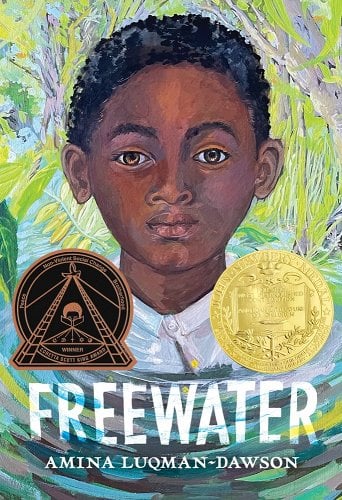The 2023 middle grade novel Freewater by Amina Luqman-Dawson (Little Brown Books for Young Readers, February 2022) offers a hopeful and dream-like success for two children fleeing slavery. Just as they feel hope of escape ebbing away, a mystery man rescues them, leading them to an island community on the edge of the swamp. Homer’s journey is filled with tension as he believes it is his fault that his mother was captured and returned to the plantation. Despite the fantastic safety of Freewater, he cannot rest until he rescues his mother.
In Freewater, former slaves have created their own community and has survived for nearly two decades. Children born there have never been off the island or seen a white man. As a haven where children have never experienced violence or slavery, Freewater provides a place of hope for the future for those who find refuge from their own trauma. But a few children are not satisfied. Homer remains frustrated and upset due to their mother being returned to the plantation and the fact that his dear friend, Anna, still remains enslaved. Sanzi, a native of Freewater, dreams to be a hero and wants the adventure of saving people from slavery. And Billy still struggles to deal with his past, even though he has been free at Freewater for seven years.
The story alternates between Homer’s first-person perspective and third-person narratives of Anna, Nora (the plantation owner’s daughter), and various children at Freewater (including Billy and Sanzi). The shifts between first person and third-person perspectives made it feel a little bit choppy at times. Consistency would have contributed to a smoother read and even more powerful story of hope. Nevertheless, I loved seeing the perspectives of the various children who each had their own plans.
Other than my hang-up about the shifting perspectives, the writing in Freewater immediately engages the reader with action, especially from Homer’s perspective during his escape. As Homer and Ada were rescued and introduced to Freewater, the story felt fantastical. Seven-year-old Ada loved exclaiming about all the new things around her after her childhood in slavery. Learning about the perspectives of Sanzi and Juna, who have never experienced slavery, adds fascination to the narrative. Freewater further feels like a children’s book as the story unfolds without actual dates, locations, and historical facts. All these aspects make the book feel like a fantasy.
The author skillfully combines this fantastical feeling with historical facts, as evident in the afterward discussing the real maroon communities that existed in the Great Dismal Swamp. Conceivably, such a community could have existed as described! The afterward informs readers about the real maroon communities in the Great Dismal Swamp, while acknowledging the challenges of uncovering their exact way of life. Without more solid archeological evidence, the exact nature of survival and number of freed individuals remains unknown.
I really appreciated that Freewater challenges unfair stereotypes by depicting white people as slow and ridiculous, with overseers are portrayed as unintelligent. (Nora, the eleven-year-old daughter of the plantation owner, is a notable exception.) What a refreshing perspective! For so long throughout history, the Black characters have been stereotyped in novels. This type of anti-stereotype also felt fresh when the Freewater-natives Sanzi and Juna are shocked by the violence they observe on the plantation. Their shock highlights the contrast between their loving experience and those of the enslaved people on the plantation. The tables have been turned as Sanzi sees a white man for the first time and wonders about his appearance and the hatred in his eyes.
Although there is some violence (most significantly, Homer’s and Ada’s mother is beaten after her runaway attempt), the novel continues with the feeling of innocence as the children become heroes in the fast-paced climax of the novel. Although I say above that these things could have happened, from my adult perspective, the coincidences the kids experience and the successes they have against adults seemed highly unlikely. Nevertheless, every child ends up playing an important role in the climax, and the reader appreciates the tidy resolution. I love this type of comradery and teamwork in a children’s novel!
Freewater was awarded the Newbery Medal in January 2023 with its a refreshing story about escaped enslaved persons. The engaging writing, fantastical atmosphere, and actual historical possibilities created an immersive experience just right for a middle grade reader. I highly enjoyed this different portrayal of a marginalized community in historical fiction.
I rate Freewater Newbery Award winner as “fantastic” and say “keep it and read it.”
Newbery rating scale: FANTASTIC | REALLY GOOD | PRETTY GOOD | OKAY | BLAH
What to do with this Newbery: KEEP IT AND READ IT | MAYBE IF YOU HAVE TIME | DON’T BOTHER

